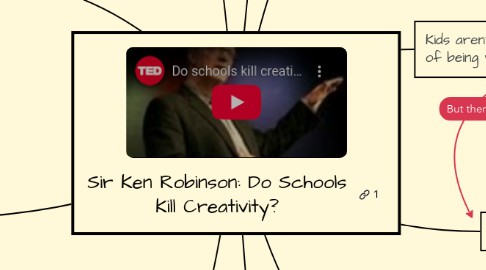Sir Ken Robinson: Do Schools Kill Creativity?
作者:Dagny Larkin


1. "In the next 30 years more people worldwide will be graduating through education since the beginning of history"
1.1. Suddenly, degrees aren't worth anything anymore
1.2. Academic inflation
1.2.1. Structure of education is shifting
1.2.2. Need to radically rethink our view of intelligence
2. Itelligence
2.1. Is diverse
2.1.1. Visually
2.1.2. Sound
2.1.3. Kinesthetically
2.1.4. Abstract
2.1.5. Movement
2.2. Is dynamic
2.2.1. Interactive
2.3. Is distinct
3. Creativity
3.1. The process of having original ideas that have value
3.2. Often comes about through the interaction of different disciplinary ways of seeing things
4. Our only hope for the future is to adopt a new conception of human ecology
4.1. One in which we start to reconstitute our conception of the richness of human capacity
4.2. Our education system has mined our minds in the way that we have strip mined the earth for a particular commodity
4.3. We have to rethink the fundamental principles on which we're educating our children
5. Mistakes are stigmatized
5.1. In adulthood
5.1.1. Adults are scared of being wrong
5.2. in national education systems
5.2.1. we're educating people out of their creative capacities
6. Introduction
6.1. Everybody has an interest in education
6.1.1. It's what shapes our future
6.2. All children have talent and we squander them
6.3. Creativity is as important in education as literacy
7. Drawing lesson anecdote
7.1. little girl is drawing picture of God
7.2. teacher: "But, nobody knows what God looks like"
7.3. little girl: "They will in a minute"
8. Kids aren't frightened of being wrong
8.1. Being wrong isn't the same thing as being creative
8.1.1. But if you're not prepared to be wrong, you'll never come up with anything original
8.2. All children are artists. The problem is how to remain an artist once he grows up. -Pablo Picasso
8.2.1. We don't grow into creativity, we grow out of it
9. Hierarchy in education systems is everywhere the same
9.1. Mathematics & Languages
9.2. Humanities
9.3. Artis
9.3.1. Art & Music
9.3.2. Drama & Dance
10. Predicated on the idea of academic ability
10.1. Education systems came into being in the 19th century
10.2. To meet the needs of industrialism
10.3. Ideals
10.3.1. Most useful subjects for work are at the top
10.3.2. Prepare for entrance in university
